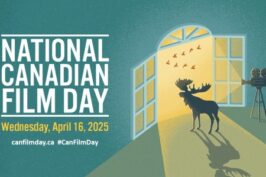First Nations activist and lawyer Caleb Behn arrived to Toronto this week to attend the International Premiere of the documentary Fractured Land, at Hot Docs. Caleb is the focal point of this film. Filmmakers Fiona Rayher and Damien Gillis have been following Behn for the past four years to learn more about him, his traditional ways, and about his legal work to advocate for Indigenous people against major extracting companies in Northern B.C.
Behn, of Eh Cho Dene and Dunne-Za heritage, comes from Treaty 8 Territory. He has been raised knowing the politics that surrounds his people, their land, and long history of struggles. Today, the community is fervently defending their territory from fracking operations. Behn plays a pivotal role in advocating for the community and the land.
Yesterday, Behn and I sat down to talk about the film — about what it means to him personally, and also what role the film can play in the on-going dialogue surrounding extracting practices in Indigenous territories in Canada and around the globe. We first talked about his involvement in this film, Rayher and Gillis had initially met with Behn when doing research for a short film about the topic of fracking in Northern B.C. Soon after that meeting, the filmmakers approached him to take more integral role in the documnentary. Behn admits, in hindsight, he is not sure he’d have agreed to participate in the film, if he’d known it would be about him.
Although many in the community, see him as a young leader. In Dena and Dunne-Za culture, being a leader is not about being in the spotlight. It’s about serving the people, but he sees the need to represent his people. If by telling his own story, he is also advocating for a bigger cause, then this was a project worth every bit of effort it took to complete.
Behn, who has yet to see the final cut of the film, is looking forward to seeing it with an audience at its premiere Hot Docs. From the length it took to complete, it is clear the film was challenging, as it was deeply personal and very emotional for him. Eloquently, Behn describes the issues we’re facing as a species, as a whole, are far beyond what we typically see on regular media and film. This documentary can be “a vehicle to create dialogue and awake a collective consciousness”.
Being a public speaker and a lawyer means Behn is often quite busy. Fractured Land is one of various projects that fit together that address the reasons why many Indigenous people are opposed to the exploitation of natural resources. In traditonal Dena/Dunne-Za perspective, “the land is not a resource; it’s an entity that deserves of our respect”. Both Behn and I share in the opinion that Canada’s policy in favouring developments for extracting industries are deeply troubling. There is little consultations with locals when such ‘developments’ are approved. Somehow, it seems “okay to [allow these projects] on Indigenous peoples’ land”. We are reaching a point where it’s no longer viable to ignore some fundamental issues surrounding extracting practices. The long term consequences are not clear; even scientists do not know yet.
When I touched upon the notion that many have the misconception Indigenous people receive ‘special treatment’, Behn talked about the continuing colonial incursions experienced by many people, around the globe. “To respect someone’s culture is basic human decency… If we treat indigenous people with respect and dignity is simple human decency. These populations are still held down formally and informally through policies and other governmental maneuvers. And these things need to be addressed… we can do better as a species. We all need to know that basic human decency makes for a more resilient society… If I see injustice, I call it injustice”. I could not agree more.
Ultimately, Behn is thankful for being able to participate in this film. He continues to work as executive director for Keepers Of The Water, doing litigation work, and “engaging with extractive industry to do good work… making marks for the better”. He continues to live traditionally; getting back on the land as much as possible; using intuition and ethics when choosing projects he works on, like this film.
We ended our conversation with the thought that we’re all complicit in the issues affecting Indigenous people, the environment and nature, globally. It is up to us to work towards “the quest to be ethical in an unethical time”. It is vital to bring these issues into public consciousness, “so together we see there are better ways to do things, and more respectful ways to treat one another”. Lots to think about. Lots to work towards.
Fractured Land screens at Hot Docs on April 29 at 9PM, April 30 at 2:30PM, and May 2 at 4PM. For full details on box office and screening locations, please visit hotdocs.ca.







